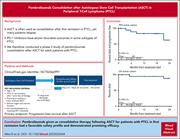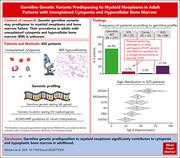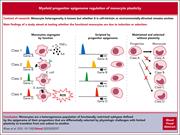Issue Archive
Table of Contents
BLOOD COMMENTARIES
CLINICAL TRIALS AND OBSERVATIONS
A phase 2 study of pembrolizumab after autologous stem cell transplantation in patients with T-cell non-Hodgkin lymphoma
Clinical Trials & Observations
Despite consolidation with autologous stem cell transplantation for treatment of peripheral T-cell lymphoma (PTCL), many patients relapse. Merrill et al report on the results of a phase 2 multicenter study of posttransplant maintenance therapy with the PD-1 inhibitor pembrolizumab in patients with PTCL who underwent transplantation in first remission. PD-1 blockade had a favorable safety profile and was associated with a progression-free survival of 83.6% and an overall survival of 94.4% at 18 months, supporting further investigation of this approach in this high-risk group of patients.
LYMPHOID NEOPLASIA
The orally bioavailable GSPT1/2 degrader SJ6986 exhibits in vivo efficacy in acute lymphoblastic leukemia
Chang and colleagues identify a novel agent with potentially selective activity in acute lymphoblastic leukemia (ALL). “Molecular glues” interact with the protein degradation pathway through targeting substrates to the ubiquitin ligase machinery. The authors developed a novel modulator of cereblon that has cytotoxic activity against ALL in primary cells and xenograft models. This agent, the first potent selective orally available degrader, merits further study for clinical development.
MYELOID NEOPLASIA
Prevalence and clinical expression of germ line predisposition to myeloid neoplasms in adults with marrow hypocellularity
CME
Clinical Trials & Observations
In this month’s CME article, Molteni et al assess the contribution of germ line genetic disposition to cytopenias and hypocellular bone marrow in 402 adult patients. Germ line and somatic mutation analyses of a panel of 60 and 54 genes respectively revealed that 6.7% of these individuals carry germ line variants known to cause a predisposition syndrome; of these, 67% had a myeloid neoplasm, and the remainder had clonal cytopenia of undetermined significance. The study elucidates a spectrum of mutations that varies with age and predisposes to myeloid neoplasm.
PHAGOCYTES, GRANULOCYTES, AND MYELOPOIESIS
Limited plasticity of monocyte fate and function associated with epigenetic scripting at the level of progenitors
Monocytes are heterogeneous and can be divided into subsets based on molecular and functional properties; however, whether the subsets are determined by cell-intrinsic mechanisms or by environmental modulation is not known. Rhee et al performed elegant single-cell tracking experiments that reveal that monocyte subtype is determined at the progenitor level and has limited plasticity; shifts in predominant subtypes reflect physiologic conditions that lead to selective maturation of subsets of progenitors.
BLOOD WORK
ERRATA
CONTINUING MEDICAL EDUCATION (CME) QUESTIONS
-
Cover Image
Cover Image
![issue cover]()
Hematoxylin and eosin staining of cytospun human blood monocytes, which are distinguishable as 4 functional subgroups defined epigenetically at the level of progenitors. See the article by Rhee et al on page 658.
- PDF Icon Front MatterFront Matter
- PDF Icon Table of ContentsTable of Contents
- PDF Icon Editorial BoardEditorial Board
Advertisement intended for health care professionals
Email alerts
Advertisement intended for health care professionals







PTCL and ICIs: a matter of time and subtype
Clinical Trials & Observations